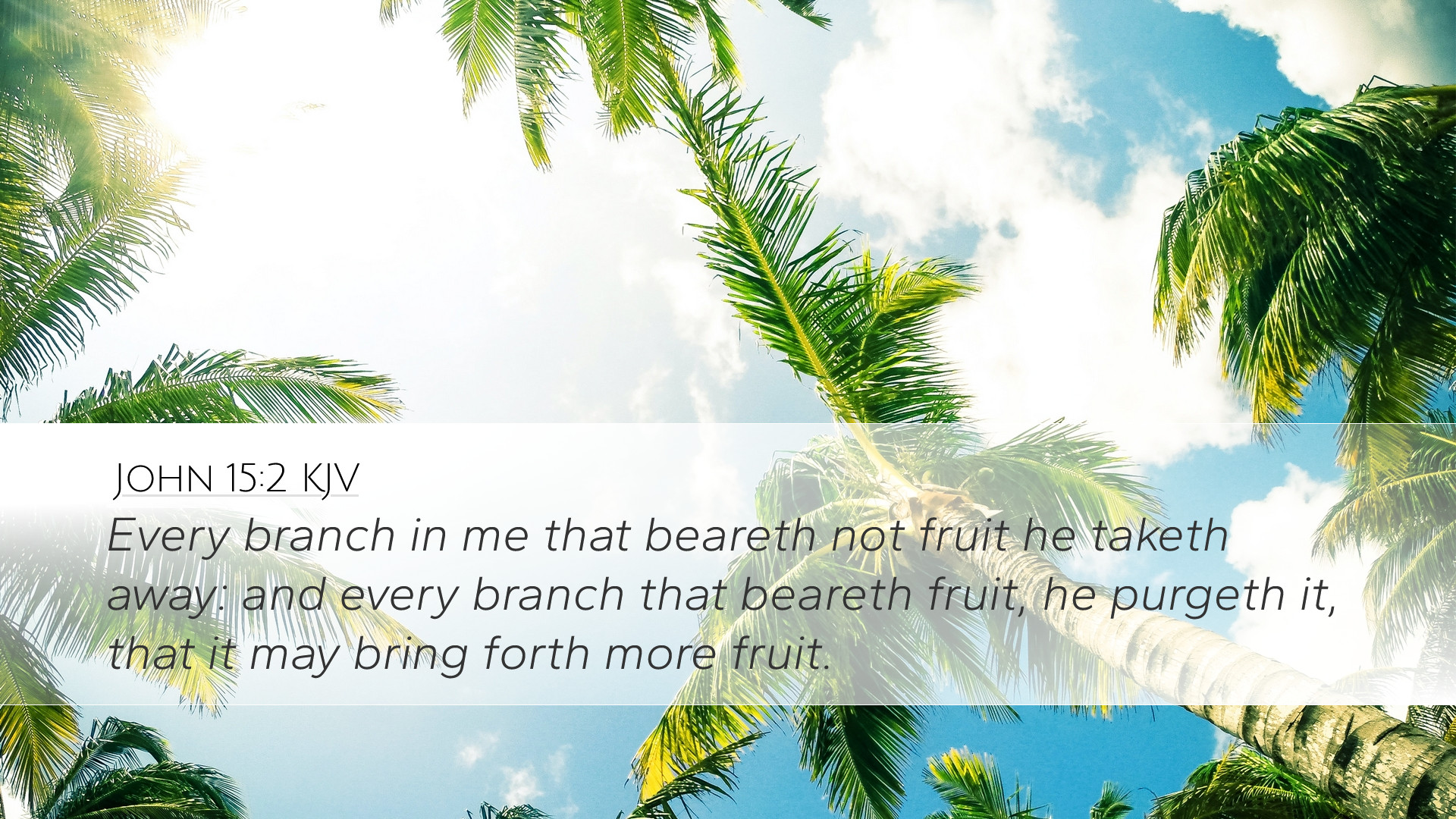Old Testament
Genesis Exodus Leviticus Numbers Deuteronomy Joshua Judges Ruth 1 Samuel 2 Samuel 1 Kings 2 Kings 1 Chronicles 2 Chronicles Ezra Nehemiah Esther Job Psalms Proverbs Ecclesiastes Song of Solomon Isaiah Jeremiah Lamentations Ezekiel Daniel Hosea Joel Amos Obadiah Jonah Micah Nahum Habakkuk Zephaniah Haggai Zechariah MalachiJohn 15:2
John 15:2 KJV
Every branch in me that beareth not fruit he taketh away: and every branch that beareth fruit, he purgeth it, that it may bring forth more fruit.
John 15:2 Bible Commentary
Commentary on John 15:2
Verse Reference: John 15:2 states, "Every branch in me that beareth not fruit he taketh away: and every branch that beareth fruit, he purgeth it, that it may bring forth more fruit."
Overview
This verse is a part of Jesus’ discourse on being the true vine, emphasizing the relationship between Him, the Father, and His followers. It underscores the necessity of bearing fruit in the Christian life, illustrating God's active role in the pruning process that believers endure to produce abundant spiritual fruit.
Insights from Public Domain Commentaries
Matthew Henry's Commentary
Matthew Henry reflects on the imagery of the vine and branches, pointing out that the vine represents Christ, while the branches refer to believers. He emphasizes that those who do not bear fruit demonstrate a lack of true connection to Christ and thus face divine removal:
- Divine Removal: Henry notes that "every branch that beareth not fruit he taketh away," indicating a serious consequence for unfruitfulness. This serves as a stark warning to those who claim to be part of the faith without genuine evidence of transformation.
- Purging for Growth: He elaborates on pruning, explaining that even fruitful branches are subjected to divine care, implying that God’s intention is to make them even more fruitful. The purging involves trials and challenges that serve to deepen one's faith and obedience.
Albert Barnes' Notes on the Bible
Albert Barnes offers valuable insights into the theological implications of the verse. He articulates that the phrase "in me" indicates a vital union with Christ:
- Implication of Union: Barnes posits that being "in Christ" is essential for any spiritual life. Those not producing fruit are not rightly connected to the vine, suggesting that external profession without internal reality leads to spiritual decay.
- Two Types of Treatment: He contrasts the fate of the unproductive branches with that of the fruitful ones. The former are taken away, symbolizing the ultimate judgment, while the latter undergo necessary purging to enhance their productivity, reflecting God’s nurturing intention.
Adam Clarke's Commentary
Adam Clarke provides a detailed analysis of the text, shedding light on the nature of pruning and its spiritual significance:
- Symbolism of Pruning: Clarke explains that pruning serves as an act of divine care, depicting how God actively works in the lives of believers to remove impediments to spiritual growth. This process can be painful but ultimately results in greater fruitfulness.
- Fruitfulness as Evidence: He stresses that the true test of one's faith is in bearing fruit, which includes good works, holiness, and winsomeness in character. Clarke articulates that fruit is not just quantity but also quality in the believer's life.
Theological Implications
John 15:2 presents profound theological implications for understanding salvation, sanctification, and divine judgment:
- Salvation: The passage highlights that mere association with Christ does not guarantee salvation. True believers are marked by the fruit they bear, indicating a transformative relationship with Him.
- Sanctification Process: The notion of pruning reflects the sanctification process, whereby the Holy Spirit works within believers to refine their character and increase their spiritual productivity.
Practical Applications
John 15:2 is rich with practical applications for the church and individual believers:
- Self-Examination: This verse invites believers to reflect on their lives and assess whether they are bearing fruit. Regular spiritual self-examination is essential in pursuing a genuine relationship with Christ.
- Embrace Pruning: Understanding that trials and challenges are part of divine pruning can help believers endure hardships with faith and expectancy of growth and greater fruitfulness.
- Encouragement to Bear Fruit: Believers are called to actively participate in the mission of Christ by bearing fruit, which can include acts of service, love, and sharing the Gospel.
Conclusion
John 15:2 serves as a sobering reminder of the seriousness of spiritual fruitfulness in the life of a believer. It underscores the necessity of an intimate connection with Christ, the transformative power of God's pruning hand, and the expectation of increased fruitfulness as a reflection of true faith. Understanding this dynamic not only enriches theological insight but also enhances the practical outworking of faith in daily life.


